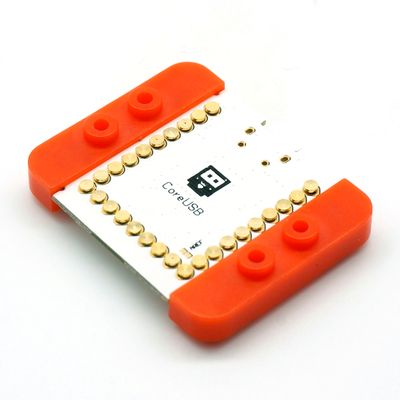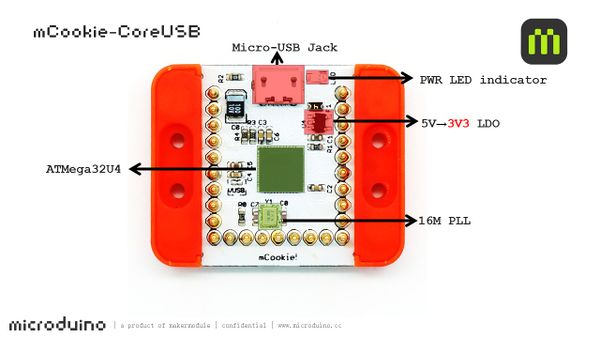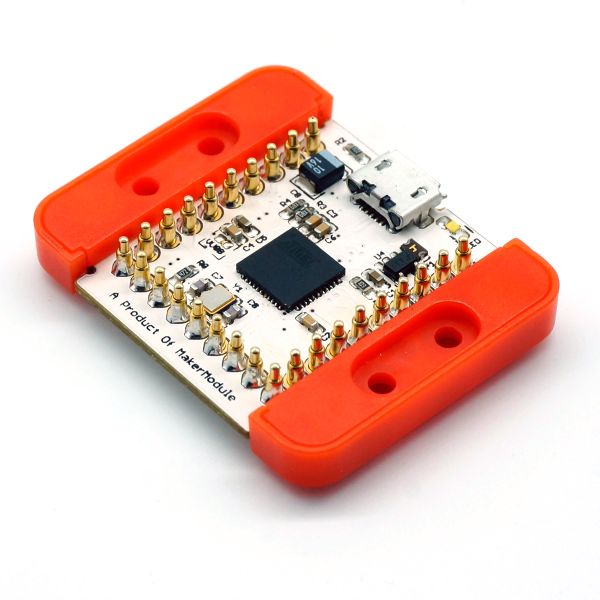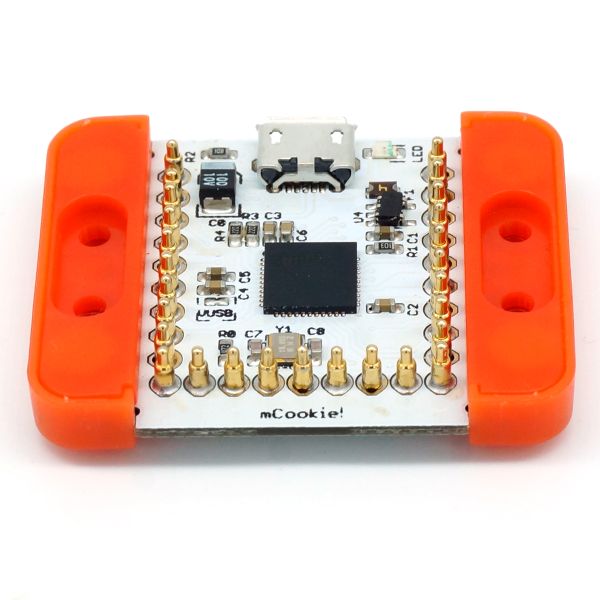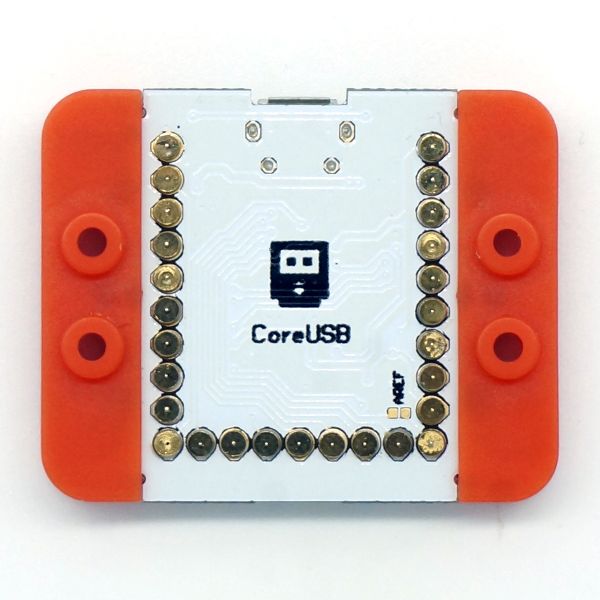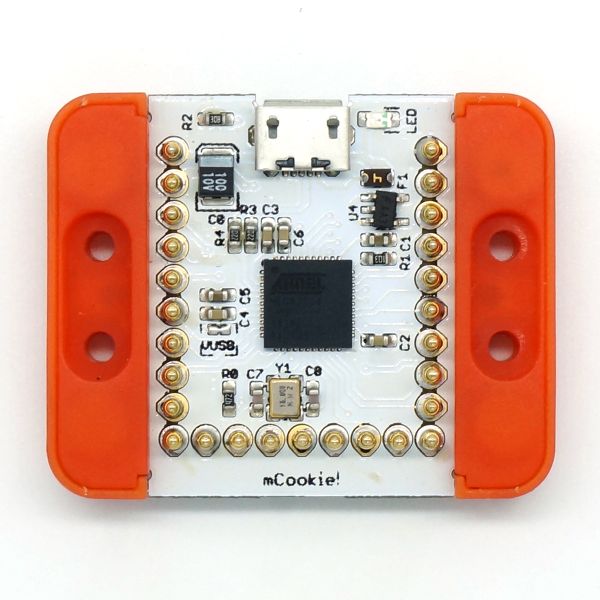Difference between revisions of "MCookie-CoreUSB"
From Microduino Wiki
| (3 intermediate revisions by 2 users not shown) | |||
| Line 4: | Line 4: | ||
| | | | ||
[[File:mCookie-core32U4-rect.jpg|400px|thumb|right|Microduino-CoreUSB]] | [[File:mCookie-core32U4-rect.jpg|400px|thumb|right|Microduino-CoreUSB]] | ||
| − | |||
| − | |||
| + | mCookie-CoreUSB is a 8-bit microcontroller development core board with ATMEGA32U4 series as the core, which is an open source, Arduino Leonardo compatible controller module. | ||
| + | mCookie adopts the same Java/C development environment with Arduino. Users can use Arduino IDE with other software Flash or Processing as well as mCookie and other electronic components, modules and sensors to make lots of interesting and interactive works. | ||
| + | |||
==Features== | ==Features== | ||
| − | *Contain | + | *Contain microcontroller and USB communication and enable to download programs via USB port. |
| − | *USB overcurrent protection | + | *USB overcurrent protection. |
| − | *Small | + | *Small, stackable, economic and open source. |
| − | *Open source hardware circuit design | + | *Open source hardware circuit design and Arduino compatible development environment for programming. |
| − | * | + | *Uniform mCookie interface standard makes it easy and flexible to connect with other mCookie modules and sensors. |
| − | |||
| − | == | + | ==Specification == |
| − | |||
| − | |||
| − | |||
| − | |||
| − | |||
| − | |||
| − | |||
| − | |||
| − | |||
| − | |||
| − | |||
| − | |||
| − | |||
| − | |||
| − | |||
| − | |||
| − | |||
{|class="wikitable" | {|class="wikitable" | ||
|- | |- | ||
| − | |Flash||32 | + | |Flash||32 KB (ATMEGA32U4))and 4KB of which are used for guide the program. |
|- | |- | ||
| − | |SRAM||2.5 | + | |SRAM||2.5 KB (ATMEGA32U4) |
|- | |- | ||
| − | |EEPROM||1 | + | |EEPROM||1 KB (ATMEGA32U4) |
|- | |- | ||
| − | |Clock | + | |Clock Frequency 0||16 MHz |
|} | |} | ||
| + | |||
| + | |||
| + | *Twenty two digital I/O ports: | ||
| + | ** Marked on the module as D0-D13 and A0-A7. | ||
| + | * Ten analog I/O ports: | ||
| + | ** Marked on the module as A0,A1,A2,A3,A6,A7,D8(A8),D9(A9),D3(A10) and D4(A11). | ||
| + | ** Each port provides a 10-bit resolution (0-1024). By default, the measuring range of voltage is the voltage values from GDN to VCC. | ||
| + | ** For more information, please refer to: '''[http://www.arduino.cc/en/Reference/AnalogRead analogRead()]''' . | ||
| + | * Support eight PWM output ports: | ||
| + | ** Marked on the module as SCL,D3,D4,D5,D6,D7,D8 and D9. | ||
| + | ** For more information, please refer to:'''[http://www.arduino.cc/en/Reference/AnalogWrite analogWrite()]'''. | ||
| + | * Support two serial ports: | ||
| + | ** USB analog Serial USB | ||
| + | ** Marked as Serial1[D0(RX) and D1(TX)]. | ||
| + | * Support SPI: | ||
| + | ** Marked as D13(SCK),D12(MISO),D11(MOSI) and D10(SS). | ||
| + | * Support I2C: | ||
| + | ** Marked as SDA(D18) and SCL(D19). | ||
| + | * External input: | ||
| + | ** Marked as SCL(interrupt0),SDA(interrupt1),D0(interrupt2),D1(interrupt3) and D2(interrupt4). | ||
| + | ** For more information, please refer to: '''[http://arduino.cc/en/Reference/AttachInterrupt attachInterrupt()]'''. | ||
| + | * Support ISP download. | ||
| Line 80: | Line 85: | ||
| 9||(SCK)PB1||D13||D13||||||||||SCK|||| | | 9||(SCK)PB1||D13||D13||||||||||SCK|||| | ||
|- | |- | ||
| − | | 10||AREF||Exterior power | + | | 10||AREF||Exterior power|||||||||||||||| |
|- | |- | ||
| 11||(ADC7/TDI)PF7||A0||D14||A0|||||||||||| | | 11||(ADC7/TDI)PF7||A0||D14||A0|||||||||||| | ||
| Line 118: | Line 123: | ||
==Document== | ==Document== | ||
| − | + | [[File:mCookie-CoreUSB-pin.jpg|center|600px]] | |
==Development== | ==Development== | ||
| Line 129: | Line 134: | ||
| − | == | + | ==FAQ== |
==Purchase== | ==Purchase== | ||
Latest revision as of 03:12, 4 August 2017
| Language: | English • 中文 |
|---|
|
mCookie-CoreUSB is a 8-bit microcontroller development core board with ATMEGA32U4 series as the core, which is an open source, Arduino Leonardo compatible controller module. mCookie adopts the same Java/C development environment with Arduino. Users can use Arduino IDE with other software Flash or Processing as well as mCookie and other electronic components, modules and sensors to make lots of interesting and interactive works.
ContentsFeatures
Specification
DocumentDevelopment
ProjectsMCookie_(Microduino Compatible)Tutorial
FAQPurchaseHistoryPicturesVideo |
